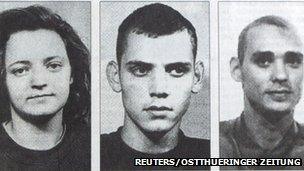German intelligence chief Heinz Fromm quits over murders
- Published

Mr Fromm took the helm of the agency in 2000 - the year the murders began
The head of Germany's domestic intelligence agency, Heinz Fromm, has resigned after a series of blunders in an investigation into a neo-Nazi cell.
The group is believed to have killed at least 10 people, most of them Turkish immigrants, over a seven-year period and then evaded capture.
A woman, Beate Zschaepe, is awaiting trial over the murders.
Mr Fromm's agency came under fresh fire last week when it emerged it shredded key documents relating to the case.
The 63-year-old has headed the Office for the Protection of the Constitution since 2000, the year the murders began.
He announced his decision to take early retirement to Interior Minister Hans-Peter Friedrich.
Mr Friedrich said Mr Fromm had been "surprised and distressed about the mistakes by employees in his authority".
"He is, like me, deeply worried about the resulting loss of confidence in the domestic intelligence agency," the minister said.
'Disgrace'
The failure of the German security services to halt the string of murders seemingly carried out by the trio who called themselves the National Socialist Underground shocked the German public when it emerged last December.

The neo-Nazi group, which has been dubbed the Zwickau cell, operated undetected for 11 years
The case only surfaced when two of the three were found dead in an apparent suicide pact and Beate Zschaepe blew up her rented flat in the east German city of Zwickau and then handed herself in to police.
In February, German Chancellor Angela Merkel described the case as "a disgrace".
She appealed for forgiveness from the families of the victims - eight businessmen of Turkish origin, one businessman of Greek origin and one German policewoman.
The group also injured more than 20 people in two bomb attacks on people of Turkish origin, as well as carrying out over a dozen bank robberies.
Authorities including the police have admitted making critical mistakes in investigating the case, and have vowed to improve regional and national intelligence co-operation.
Last week it emerged at an intelligence oversight committee that an agency official had shredded key documents about the activities of far-right informers, just one day after it was revealed that the cell was involved in the murders.
- Published27 March 2012
- Published23 February 2012
- Published18 January 2012
- Published9 December 2011
- Published7 December 2011
- Published1 December 2011
- Published18 November 2011